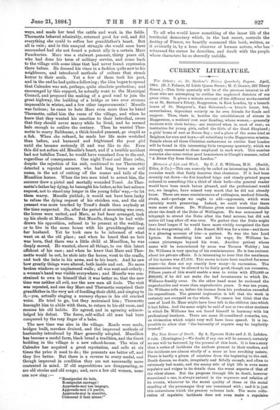Memoirs of Life and Work. By C. J. B. Williams,
M.D. (Smith, Elder, & Co.)—This can scarcely be called an interesting book, but it contains much that fairly deserves that character. If it had been severely cut down—its five hundred large and closely-printed pages reduced to something like a third of their bulk—the general reader would have been much better pleased, and the professional would not, we imagine, have missed very much that he did not already know. There are some reminiscences of colleagues, medical friends, rivals, and—perhaps we ought to add—opponents, which were certainly worth preserving. Indeed, we could wish that there were more of these. Dr. Williams gives some interesting details about the death of the Deice of Wellington. He was summoned by telegraph to attend the Duke after the fatal seizure, but did not arrive till long after all was over. We gather that the Duke might have lived longer if he would have more vividly recognised the fact that he was growing old. John Stuart Mill was for a time—and there is a pleasing account of him—a patient. So was the late Lord Lytton. In describing him and his ways, Dr. Williams be- comes picturesque beyond his wont. Another patient whose name will be remembered by some was Thomas Wakley ; but Dr. Williams is very sparing of his reminiscences. He is less reticent about his private affairs. It is interesting to hear that the maximum of his income was 27,000. This seems to have been reached for some years—he does not say exactly how many—in succession. The remuneration may be allowed to be fairly good, though not excessive. Fifteen years of this would enable a man to retire with 270,000 or 280,0015, if he did not make the bad investments to which Dr. Williams frankly owns. On the other hand must be reckoned the unproductive and worse than unproductive years. It was ten years, Dr. Williams tells us, before his income from his profession exceeded his expenditure. The general impression is left that the work is certainly not overpaid on the whole. We cannot but think that the case of Lord St. Maur might have been left in the oblivion into which it had fallen. And the same might be said of one or two other matters in which Dr. Williams has not found himself in harmony with his professional brethren. There are some ill-considered remarks, too, on vivisection which might very well have been spared. It is im- possible to allow that "the humanity of experts may be implicitly trusted."


































 Previous page
Previous page